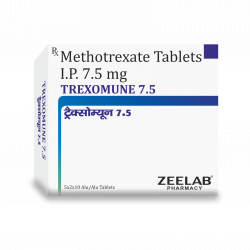Methotrexate
Methotrexate is a medication used to treat various conditions, including certain types of cancer and autoimmune diseases like rheumatoid arthritis and psoriasis. It works by inhibiting the growth of certain cells in the body. Methotrexate is often prescribed for both long-term and short-term treatment and is available in different forms. Its effectiveness in treating autoimmune disorders and cancer has made it a vital treatment option for many patients.
Uses of Methotrexate
- Treats rheumatoid arthritis
- Used for certain types of cancer, such as leukemia and lymphoma
- Effective in managing psoriasis
- Treats Crohn’s disease and ulcerative colitis
- Helps with other autoimmune conditions
How Methotrexate Works
Methotrexate works by blocking the action of folic acid, which is necessary for the production of DNA. This slows down the growth of abnormal cells, especially in conditions like cancer and autoimmune diseases. By interfering with the rapid division of cells, Methotrexate helps manage symptoms and promote healing in affected tissues.
Benefits of Methotrexate
- Reduces inflammation in conditions like rheumatoid arthritis
- Inhibits cancer cell growth in chemotherapy
- Improves skin conditions in psoriasis patients
- Helps manage chronic autoimmune diseases
- Effective in reducing flare-ups in inflammatory bowel diseases
How to Take Methotrexate
Methotrexate can be taken orally in the form of tablets or by injection, depending on the condition being treated. Dosage varies based on the specific condition and its severity. It is essential to follow your doctor’s instructions carefully to avoid any complications. Typically, it is taken once a week for certain conditions, but your doctor will provide guidance specific to your treatment plan.
Type of Dosage Available
- Methotrexate tablets (2.5 mg, 5 mg, 10 mg)
- Methotrexate injection (25 mg/mL)
- Oral solution of Methotrexate
Side Effects of Methotrexate
- Common side effects: nausea, mouth sores, fatigue, dizziness, hair loss
- Severe side effects: liver toxicity, lung damage, low white blood cell count, severe infections
- May cause bone marrow suppression with prolonged use
Safety Advice
- Regular blood tests are required to monitor liver function and blood cell counts during treatment.
- Avoid alcohol consumption while taking Methotrexate as it can increase the risk of liver damage.
- Do not take Methotrexate if pregnant or planning to become pregnant. It may cause birth defects.
- Always consult your doctor before stopping Methotrexate or adjusting the dosage.
Frequently Asked Questions (FAQs)
Q: How long does it take for Methotrexate to work?
A: Methotrexate may take several weeks to show significant effects, especially for conditions like rheumatoid arthritis or psoriasis.
Q: Can Methotrexate be taken with other medications?
A: Yes, but it's important to inform your doctor of all medications you're taking, as Methotrexate can interact with other drugs.
Q: What should I do if I miss a dose of Methotrexate?
A: If you miss a dose, take it as soon as you remember, unless it’s almost time for your next dose. Do not double the dose.
Q: Is Methotrexate safe for long-term use?
A: While Methotrexate is effective for long-term treatment, regular monitoring by your healthcare provider is essential to prevent serious side effects.
Download India's most affordable pharmacy app
- Compare with medicine prices
- Save upto 90% on your medicine bills

Temperature Controlled storage and delivery

Regular Sanitization

Disinfected Packaging
















 Added!
Added!